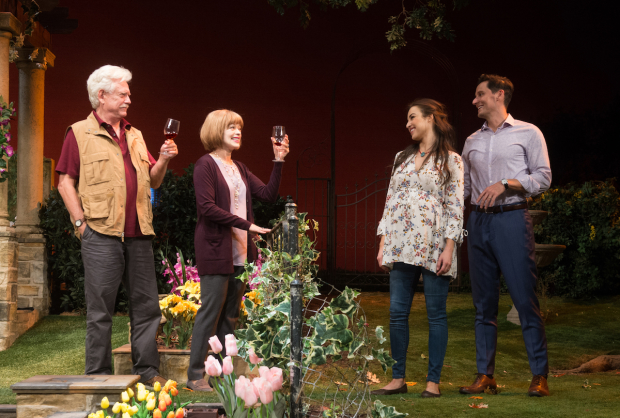Native Gardens Proves Good Fences Can Make for Bad Neighbors

(© Jenny Graham)
The pursuit of happiness and property is embedded in the American dream. Thomas Jefferson even added it to the Declaration of Independence as an inalienable right. Unfortunately, with property come neighbors and the frustration of sharing a fence with a stranger. Playwright Karen Zacarías's comedy Native Gardens demonstrates what happens when you must battle your neighbor for your own land.
Pablo (Christian Barillas) and his pregnant wife Tania (Jessica Meraz) move into an influential Washington, D.C. neighborhood and meet their friendly but distant neighbors, Frank (Bruce Davison) and Virginia (Frances Fisher). Frank pridefully fosters his lush garden with tulips and hydrangeas, while Tania passionately dreams of turning her yard into a native garden, with flowers indigenous to the territory that will foster the lifeline of bees and other essential insects. But fundamental differences in horticulture are just the start of the two couples' consternation. When a survey discovers that 80 square feet of Frank's cherished garden are legally the new neighbors' property (thirty-some thousand dollars worth of land), the garden gloves come off. With Frank's local garden contest on Sunday and Pablo's law firm's BBQ in his yard on Saturday, the week has become a pressure cooker with civility steaming away.
Native Gardens pokes fun at Latin America-U.S. relations, entitlement, and the current situation on the border through characters battling over a wall and who will pay for it. Zacarías avoids one-dimensionality by giving each character determined motivations and histories. Frank and Virginia have enjoyed the riches of the upper echelon after Virginia overcame a poor childhood to rise through the ranks as an engineer at Lockheed Martin. The couple believe they have earned everything they have and that they themselves are the victims, even though the land isn't rightfully theirs. Meanwhile, Pablo, who grew up wealthy, married the middle-class Tania, which led to his powerful Chilean family disowning him. Tania has been balancing establishing her new house, caring for her gestating baby, and finishing up her dissertation for her PhD.
All of these characters have roots, which makes the audience care for the situations. But that's where it feels like Zacarías stops tending to her characters, as beyond that, the dialogue feels a bit stale, and the ending predictable. Director Jason Alexander doesn't allow the material to blossom. Everything is presented on the surface — there's not enough deep digging here. The concept and presentation of three gardeners, acting as a Greek chorus, moving scenery, and mulling around with the audience before the show, was intended to provide mirth, but comes off as hackneyed.
Luckily, Davison and Fisher are pros and seamlessly turn Frank and Virginia into real people. Their chemistry suggests a couple who have lived, loved, and whined together for many years. Barillas and Meraz seem less comfortable on the stage than their sublime colleagues. Instead of feeling like they are embodying their characters' words and thoughts, their dialogue falls flat coming out of their mouths.
Designer Raquel Barreto's costumes perfectly match each character, reflecting K Street affluence attempting to relax in privacy. Everyone looks casual but in the style of a Calvin Klein ad. David Meyer's colorful set visually separates Frank's mannered, trimmed garden to the earthy, undeveloped yard to the right.
Native Gardens's subject matter is instantly relatable to anyone who has shared a wall or a property line with another person. It also echoes the current divisive political climate. But though the audience will recognize the parallels, the play does not dive deep enough, nor is it sharp enough. Rather, it feels like Tania's lone weed in Frank's well-fertilized garden.










